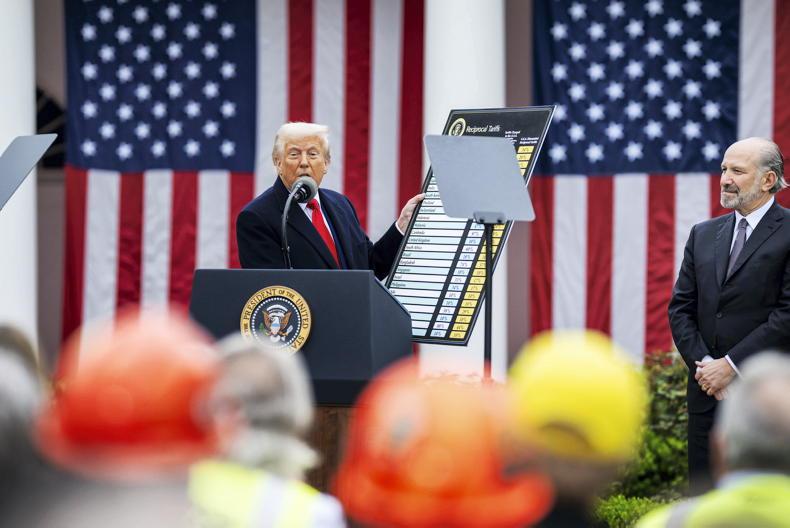In its response to a UK government consultation on a future tariff regime to apply on imports from 1 January 2021, the Ulster Farmers Union (UFU) has highlighted a number of concerns.
In particular, the union was critical that the consultation was done over a short four-week period, rather than the normal 12 weeks, and that it was not accompanied by any economic modelling that would have detailed the likely impact of the changes.
The Department for International Trade consultation was opened at the start of February and set out plans to simplify the tariff regime. Currently, EU tariffs apply to UK imports.
Changes
The main changes proposed were:
That the UK will completely remove 'nuisance tariffs' of 2.5% or less.That tariffs will be rounded down. Tariffs under 20% will be rounded to the nearest 2.5%; tariffs between 20% and 50% will be rounded down to the nearest 5%; and tariffs over 50% will be rounded down to the nearest 10%.Agricultural tariffs will be expressed as a single percentage rather than a mixed or compound tariff. For example, the tariff on fresh boneless cuts of beef is currently 12.8% + €303.40/100kg.On that latter point, UFU president Ivor Ferguson believes that calculating agricultural tariffs as a single percentage could undermine their effectiveness.
“A fall in prices would reduce the protection of local producers. This could subsequently lead to an import surge at a time of already low prices, further compounding the market problem,” he pointed out.
To aid administration and avoid competitiveness being undermined for producers in Northern Ireland (NI), he would like to see maximum alignment of UK and EU tariffs.
That would also help prevent the UK market being flooded with imported food produced to lower standards – a key concern of farm lobby organisations across the UK.
However, it would also act as a significant economic barrier to Republic of Ireland produce, unless a UK/EU free trade agreement is done.
Food prices
At what level the UK will actually set tariffs is not known. There are those in UK government who want to liberalise agricultural tariffs in the pursuit of cheaper food.
Responding to that, Ferguson points out that food has never been more affordable, and with only 10% of the UK weekly household budget going on food (compared with 30% in the 1950s), it is the third-lowest in the world (behind the USA and Singapore).
“The UFU is aware that the impact of rising food prices is most deeply felt by those who are earning a below-average income. However, we suggest this is due to other economic and social policies as opposed to being caused by the price of food,” he said.
Read more
Ministers want NI Brexit deal changed
Economic case for Brexit melts
In its response to a UK government consultation on a future tariff regime to apply on imports from 1 January 2021, the Ulster Farmers Union (UFU) has highlighted a number of concerns.
In particular, the union was critical that the consultation was done over a short four-week period, rather than the normal 12 weeks, and that it was not accompanied by any economic modelling that would have detailed the likely impact of the changes.
The Department for International Trade consultation was opened at the start of February and set out plans to simplify the tariff regime. Currently, EU tariffs apply to UK imports.
Changes
The main changes proposed were:
That the UK will completely remove 'nuisance tariffs' of 2.5% or less.That tariffs will be rounded down. Tariffs under 20% will be rounded to the nearest 2.5%; tariffs between 20% and 50% will be rounded down to the nearest 5%; and tariffs over 50% will be rounded down to the nearest 10%.Agricultural tariffs will be expressed as a single percentage rather than a mixed or compound tariff. For example, the tariff on fresh boneless cuts of beef is currently 12.8% + €303.40/100kg.On that latter point, UFU president Ivor Ferguson believes that calculating agricultural tariffs as a single percentage could undermine their effectiveness.
“A fall in prices would reduce the protection of local producers. This could subsequently lead to an import surge at a time of already low prices, further compounding the market problem,” he pointed out.
To aid administration and avoid competitiveness being undermined for producers in Northern Ireland (NI), he would like to see maximum alignment of UK and EU tariffs.
That would also help prevent the UK market being flooded with imported food produced to lower standards – a key concern of farm lobby organisations across the UK.
However, it would also act as a significant economic barrier to Republic of Ireland produce, unless a UK/EU free trade agreement is done.
Food prices
At what level the UK will actually set tariffs is not known. There are those in UK government who want to liberalise agricultural tariffs in the pursuit of cheaper food.
Responding to that, Ferguson points out that food has never been more affordable, and with only 10% of the UK weekly household budget going on food (compared with 30% in the 1950s), it is the third-lowest in the world (behind the USA and Singapore).
“The UFU is aware that the impact of rising food prices is most deeply felt by those who are earning a below-average income. However, we suggest this is due to other economic and social policies as opposed to being caused by the price of food,” he said.
Read more
Ministers want NI Brexit deal changed
Economic case for Brexit melts










SHARING OPTIONS